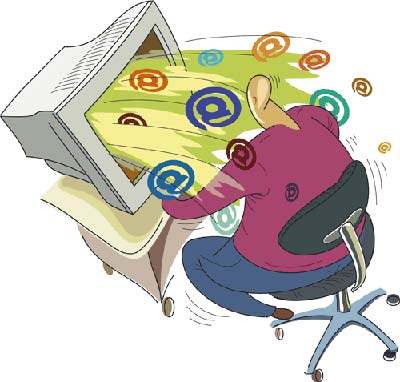電子郵件是一種便利、高效的現(xiàn)代通訊工具。表面上看,收發(fā)郵件輕而易舉,但實(shí)際上它對(duì)個(gè)人的要求近乎苛刻:寫郵件時(shí)你必須注意書信文體,收到郵件必須快速回復(fù);為了避免不恰當(dāng)?shù)难赞o,你還不能在眩暈、生氣、疲倦或醉酒時(shí)寫郵件。
By Sasha Issenberg
∷高檀 選注

In the early days of the inbox, it afforded the na?ve human organism a certain pleasure to receive an email.[1] Ah,someone thinking of me... So a note or two of greetings whistled through the lonely day.[2] Thanks to email, the eloquence of a moribund letter-writing culture received a rejuvenating jolt of immediacy.[3] As late as the late 1990s and early 2000s, during the last days of dial-up, it still felt nice to send and receive the occasional squib, to play an epistolary game of catch with some friends.[4] Sometimes you would even forward a joke, a larky practice that nowadays seems an unconscionable crime.[5]
For it has lately become clear that nothing burdens a life like an email account. It’s the old story: the new efficient technology ends up costing far more time than it ever saves, because it breeds[6] new expectations of what a person can possibly do. So commuters[7] in their fast cars spend hours each day in slow traffic, and then at the office they read and send email.
Correct emailing practice does not exist. The true mood of the form is spontaneity, alacrity[8]—the right time to reply to a message is right away. But do that and your life is gone. So you reject the spontaneous spirit of email; you hold off[9] replying for hours, days, even weeks. By then the initiatory email has gone stale, and your reply is bound to be labored.[10] You compensate for the offence with a needlessly elaborate message.
You ask polite questions to which you pray there will never come an answer. Oh, but there will.
Of course you could always reply gruffly, and in lowercase.[11] Moreover, you could refuse to reply at all except where some practical matter was at issue. But Western civilization has always reserved for correspondence its most refined gestures of courtesy, and a memory of the old days persists.[12] Over email, you can be in touch with so many people—and make each one mad at you. And they are mad at you, your former friends, because no more
efficient vehicle for the transmission of rashness and spleen has ever been devised than the email.[13] Nettled by something—often something imaginary, since no one’s tone comes across quite right, over email—you lash out instantaneously.[14] You hit SEND and it’s too late. It’s too late because it’s too soon.
Email is good for one thing only: flirtation[15]. The problem with flirtation has always been that the nervousness you feel in front of the object of your infatuation deprives you of your wittiness.[16]
But with email you can spend an hour refining a casual sally.[17] The email, like the Petrarchan sonnet, is properly a seduction device.[18] But one has many correspondents, and few if any lovers. Individually, they’re all decent people; collectively, they form
an army marching to invade your isolation and ransack[19] your valuable time. Nietzsche declared that one should set aside an hour a week for reading letters; anything more was toxic.[20]
And now we read in the paper where Gloria Steinem[21] is complaining that she spends three hours a day replying to email. America, most efficient country on earth, is in fact a nightmare economy of squandered[22] time. Our economic system condemns people to[23] work in offices and send email; that’s what they do there. Then they go home and take with them all the work they were supposed to be doing all day.
We too have sometimes been the have-nots[24] in the email economy. In the role of supplicant emailer, we have labored to achieve the impossible right tone: so winning that others will have to write back,[25] so casual you can pretend it doesn’t matter when they don’t. The whole thing is painful all around. And this, finally, is what must be understood: email, which presents itself as a convenience, a breeze, is in fact a stern disciplinary phenomenon.[26] You must not stray[27] too far from your desk. You must be polite, you must write back soon. And yet in order to strike the right note, you must not write when too giddy,[28] angry, tired, or drunk. Always at the disposal of email, never, except guiltily, at the disposal of your moods...[29] It fits our phase of capitalism: the collective attitude is casual, natural-seeming, offhand; the discipline is constant and intense.[30]
For a while, email, in its efficiency, had seemed to serve very nicely the means of production and their owners. But lately, the business pages report a dialectical reversal whereby the means of communication overwhelm the means of production,[31] so that the class of owners and managers can hardly do or even supervise any work; they can only discuss,over email, the things they should be doing.
Western civilization has become a giant inbox; it will swell and groan but never be empty till it crashes.[32] Yes, it may be that all of us together, tapping out ephemera at our keyboards, will bring down this civilization once and for all.[33]
1. inbox: 收件箱;afford: 給予;na?ve: 幼稚的;human organism: 人體組織。
2. 就這樣,一兩封簡(jiǎn)短的問(wèn)候信在孤獨(dú)的日子里嗖嗖傳遞著。
3. 多虧電子郵件,寫信這種行將消失的文化行為,在生動(dòng)流暢的基礎(chǔ)上,又獲得了一種直接性和即時(shí)性,從而突然變得煥然一新。
4. dial-up: 撥號(hào)上網(wǎng),20世紀(jì)90年代剛有互聯(lián)網(wǎng)的時(shí)候,撥號(hào)上網(wǎng)是一種較普遍的上網(wǎng)方式,進(jìn)入21世紀(jì),它又逐漸被其他方式所取代; squib: (幽默的)短文;epistolary: 用書信進(jìn)行的。
5. forward: 轉(zhuǎn)發(fā);larky: 鬧著玩的;unconscionable: 無(wú)禮的,過(guò)分的。
6. breed: 引起,造成。
7. commuter: 通勤者。
8. mood: 基調(diào);spontaneity: 自發(fā)性,形容詞為spontaneous;alacrity: 爽快,欣然。
9. hold off: 拖延。
10. go stale: 走味,變舊;labored: 不自然的,矯揉造作的。
11. gruffly: (態(tài)度)生硬地;in lowercase: 用小寫字母,表示無(wú)關(guān)緊要的事情。
12. correspondence: 通信,correspondent指“通信者”;refined: 優(yōu)雅的;
cour tesy: 謙恭,禮貌。這句話的意思是:通信者應(yīng)該始終保持謙恭禮貌的態(tài)度,包括及時(shí)回信。
13. 他們——你以前的朋友們——很生你的氣,因?yàn)闆](méi)有什么工具設(shè)計(jì)得能比電子郵件更直接有效地傳遞你的輕率魯莽和壞脾氣。
14. 你被一些事情激怒后——常常是想象出來(lái)的事情,因?yàn)樵陔娮余]件中,沒(méi)有誰(shuí)的語(yǔ)氣能完全準(zhǔn)確地傳達(dá)——即刻予以猛烈回?fù)簟?/p>
15. flirtation: 調(diào)情,挑逗。
16. infatuation: 熱戀,迷戀;wittiness: 機(jī)智,隨機(jī)應(yīng)變。
17. refine: 提煉(文字等),使(語(yǔ)言等)文雅;sally: 俏皮話,妙語(yǔ)。
18. Petrarchan sonnet: (彼特拉克推廣的)彼特拉克體十四行詩(shī),彼特拉克(1304—1374)是意大利詩(shī)人、歐洲人文主義運(yùn)動(dòng)的主要代表,著有愛(ài)情詩(shī)《抒情詩(shī)集》,他在這部十四行詩(shī)集中贊美了一個(gè)名叫勞拉的女子;seduction: 引誘,誘惑。
19. ransack: 掠奪,剝奪。
20. Nietzsche: 尼采(1844—1900),德國(guó)哲學(xué)家;toxic: 非常有害的。
21. Gloria Steinem: 格洛麗亞?斯泰納姆,美國(guó)女權(quán)運(yùn)動(dòng)家、記者。
22. squander: 浪費(fèi),揮霍。
23. condemn sb. to: 迫使某人處于(不幸的狀態(tài)或位置)。
24. have-nots: 窮人,貧民,此處指寫電郵不是件容易的事。
25. supplicant: 懇求的;labor: 努力爭(zhēng)取;winning: 有吸引力的,討人喜歡的。
26. breeze: 輕而易舉的事;stern: 苛刻的,嚴(yán)肅的;disciplinary: 紀(jì)律的,懲戒性的。
27. stray: 離開(kāi),游離。
28. strike the right note: 說(shuō)得恰當(dāng);giddy: 暈眩的。
29. at the disposal of: 受……的支配;guiltily: 內(nèi)疚地。
30. 這一點(diǎn)與我們所處的資本主義階段相符:共有的姿態(tài)是隨意、貌似自然、滿不在乎;而要求卻是始終存在、十分嚴(yán)格的。
31. business pages: 指商業(yè)報(bào)刊;dialectical: 辯證的;reversal: 逆轉(zhuǎn);overwhelm: 超過(guò),此處指商家要耗費(fèi)大量的時(shí)間于電子郵件的往來(lái)通信上。
32. 西方文明已然變成了一個(gè)巨大的“收件箱”;它將不斷膨脹、負(fù)重累累,直至崩潰——這時(shí)方能全部清空。
33. 作者認(rèn)為電子郵件耗時(shí)費(fèi)力,如果人人都在收發(fā)郵件上投入過(guò)多的精力,人類文明必將面臨巨大的災(zāi)難。ephemeral: 生命短暫的事物,指電子郵件。
(來(lái)源:英語(yǔ)學(xué)習(xí)雜志)
